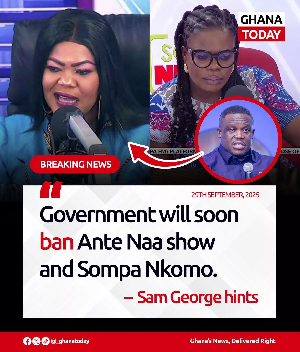This blog is managed by the content creator and not GhanaWeb, its affiliates, or employees. Advertising on this blog requires a minimum of GH₵50 a week. Contact the blog owner with any queries.
Mercy360 Blog of Tuesday, 30 September 2025
Source: Mercy Mensah

The Minister for Communication, Hon. Sam George, has indeed made statements about potentially closing certain radio and television programs. Specifically, he mentioned Oyerepa Afutuo and Sompa Nkomo as programs that might be affected. According to him, these programs, despite their benefits, are having a negative impact on Ghanaians.
This isn’t the first time Hon. Sam George has been involved in regulating the media industry. In the past, he has addressed Parliament about shutting down media houses that don’t comply with broadcasting regulations. For instance, in June 2025, 64 media houses were closed due to regulatory breaches.
The closures were attributed to various reasons, including expired licenses and failure to comply with authorization procedures. In some cases, media houses were operating without proper authorization, which is a serious offense. Hon. Sam George emphasized the importance of adhering to the law and ensuring that media houses operate within established guidelines.
The Minister’s stance on media regulation highlights the need for accountability and compliance in the industry. By enforcing regulations, the government can ensure that media houses operate responsibly and provide high-quality content to their audiences.
If the government proceeds with banning certain social programs, it could have significant implications for the media landscape in Ghana. Some potential concerns include the impact on freedom of expression and the diversity of voices in the media.
It’s essential to stay informed about the latest developments in this story through reputable news sources. Ghanaian media outlets like Oyerepa FM/TV, Nhyira FM, and SOMPA FM provide reliable news and updates on current events.
The potential ban on certain programs raises questions about the criteria used to determine which programs are allowed to operate. Will the government provide clear guidelines for media houses to follow, or will the decision be made on a case-by-case basis?
Ultimately, the outcome of this situation will depend on various factors, including the government’s regulatory framework and the response of the media industry. By staying informed and engaging in constructive dialogue, we can better understand the implications of this development and its potential impact on Ghana’s media landscape.


